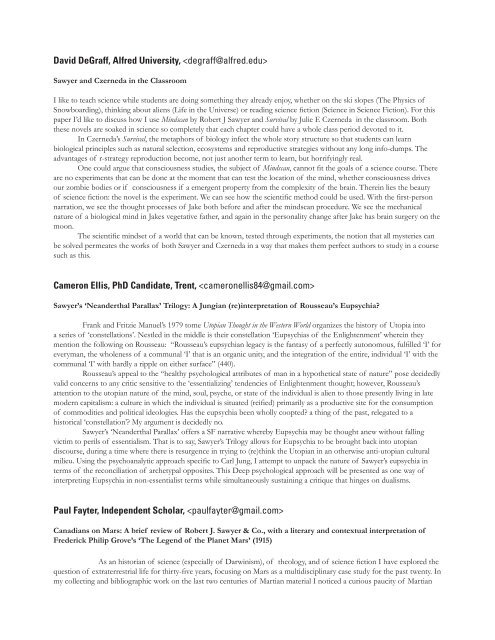SCIENCE FICTION - Author Robert J. Sawyer
SCIENCE FICTION - Author Robert J. Sawyer
SCIENCE FICTION - Author Robert J. Sawyer
Create successful ePaper yourself
Turn your PDF publications into a flip-book with our unique Google optimized e-Paper software.
David DeGraff, Alfred University, <strong>Sawyer</strong> and Czerneda in the ClassroomI like to teach science while students are doing something they already enjoy, whether on the ski slopes (The Physics ofSnowboarding), thinking about aliens (Life in the Universe) or reading science fiction (Science in Science Fiction). For thispaper I’d like to discuss how I use Mindscan by <strong>Robert</strong> J <strong>Sawyer</strong> and Survival by Julie E Czerneda in the classroom. Boththese novels are soaked in science so completely that each chapter could have a whole class period devoted to it.In Czerneda’s Survival, the metaphors of biology infect the whole story structure so that students can learnbiological principles such as natural selection, ecosystems and reproductive strategies without any long info-dumps. Theadvantages of r-strategy reproduction become, not just another term to learn, but horrifyingly real.One could argue that consciousness studies, the subject of Mindscan, cannot fit the goals of a science course. Thereare no experiments that can be done at the moment that can test the location of the mind, whether consciousness drivesour zombie bodies or if consciousness if a emergent property from the complexity of the brain. Therein lies the beautyof science fiction: the novel is the experiment. We can see how the scientific method could be used. With the first-personnarration, we see the thought processes of Jake both before and after the mindscan procedure. We see the mechanicalnature of a biological mind in Jakes vegetative father, and again in the personality change after Jake has brain surgery on themoon.The scientific mindset of a world that can be known, tested through experiments, the notion that all mysteries canbe solved permeates the works of both <strong>Sawyer</strong> and Czerneda in a way that makes them perfect authors to study in a coursesuch as this.Cameron Ellis, PhD Candidate, Trent, <strong>Sawyer</strong>’s ‘Neanderthal Parallax’ Trilogy: A Jungian (re)interpretation of Rousseau’s Eupsychia?Frank and Fritzie Manuel’s 1979 tome Utopian Thought in the Western World organizes the history of Utopia intoa series of ‘constellations’. Nestled in the middle is their constellation ‘Eupsychias of the Enlightenment’ wherein theymention the following on Rousseau: “Rousseau’s eupsychian legacy is the fantasy of a perfectly autonomous, fulfilled ‘I’ foreveryman, the wholeness of a communal ‘I’ that is an organic unity, and the integration of the entire, individual ‘I’ with thecommunal ‘I’ with hardly a ripple on either surface” (440).Rousseau’s appeal to the “healthy psychological attributes of man in a hypothetical state of nature” pose decidedlyvalid concerns to any critic sensitive to the ‘essentializing’ tendencies of Enlightenment thought; however, Rousseau’sattention to the utopian nature of the mind, soul, psyche, or state of the individual is alien to those presently living in latemodern capitalism: a culture in which the individual is situated (reified) primarily as a productive site for the consumptionof commodities and political ideologies. Has the eupsychia been wholly coopted? a thing of the past, relegated to ahistorical ‘constellation’? My argument is decidedly no.<strong>Sawyer</strong>’s ‘Neanderthal Parallax’ offers a SF narrative whereby Eupsychia may be thought anew without fallingvictim to perils of essentialism. That is to say, <strong>Sawyer</strong>’s Trilogy allows for Eupsychia to be brought back into utopiandiscourse, during a time where there is resurgence in trying to (re)think the Utopian in an otherwise anti-utopian culturalmilieu. Using the psychoanalytic approach specific to Carl Jung, I attempt to unpack the nature of <strong>Sawyer</strong>’s eupsychia interms of the reconciliation of archetypal opposites. This Deep psychological approach will be presented as one way ofinterpreting Eupsychia in non-essentialist terms while simultaneously sustaining a critique that hinges on dualisms.Paul Fayter, Independent Scholar, Canadians on Mars: A brief review of <strong>Robert</strong> J. <strong>Sawyer</strong> & Co., with a literary and contextual interpretation ofFrederick Philip Grove’s ‘The Legend of the Planet Mars’ (1915)As an historian of science (especially of Darwinism), of theology, and of science fiction I have explored thequestion of extraterrestrial life for thirty-five years, focusing on Mars as a multidisciplinary case study for the past twenty. Inmy collecting and bibliographic work on the last two centuries of Martian material I noticed a curious paucity of Martian


